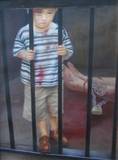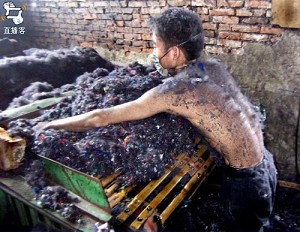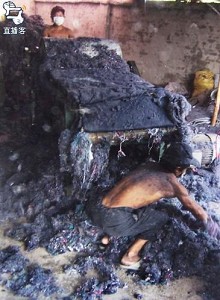Liaoning Masanjia Labor Camp
Address:
Masanjia Village, Masanjia Town, Yuhong District, Shenyang City
Liaoning Province, northeast China
Post Code: 110145
Tel: 024-89210822, 024-89212252, 024-89210454
Brief about Masanjia
The Masanjia Labor Camp, also called the “Ideology Education School of Liaoning Province,” is located in a suburb of Shenyang City, and is notorious for its heinous crimes against Falun Gong practitioners and known worldwide for its forced-brainwashing techniques.
Over the past four years and seven months, from July 1999 to February 2004, at least 99 practitioners were murdered there because of their belief in the universal principle of “Truthfulness-Compassion-Tolerance.” Their ages ranged from 27 to 65 and majority of them were only between 31 and 39 years old.
In one incident that was reported by several news agencies, 18 female practitioners were stripped naked and thrown into the cells of male criminals.
The Masanjia Labor Camp is a fascist camp for the purpose of enslaving prisoners to perform labor for profit. Prisoners must work for extended hours under the most appalling conditions.
The main “business” of the women’s section of the Masanjia Labor Camp is textile production. Not only are the detainees not paid, but also their work hours and workloads are pushed to the limit to “boost productivity and profits.”
Falun Gong practitioners from 14 years of age to over 60 have been forced to do intensive labor in the labor camp. They are routinely forced to work 14-16 hours a day, with no days off. Sometimes when there is a big order, they are forced to work for 36 hours nonstop.Falun Gong practitioners live in the most inhumane conditions. There is no bathroom in the camp. They are not allowed to brush their teeth, or to wash, shower, or change their clothes. Even the time for using the toilet is limited. The food given is minimal and is often rotten.
The horrendous conditions and excessive workload damage the health of the practitioners. Many have swollen legs and experience irregular menstruation. Some even develop atrophy of their buttocks due to the extensive hours of being forced to sit still and work.
Due to exhaustion, some have even fainted while working. However, no matter what physical conditions they are in, and no matter what the state of their health, they are not spared from the hard labor.
Torture methods used in Masanjia Labor camp
Nearly 100 torture methods used at the Masanjia Forced Labor Camp to force Falun Gong practitioners to renounce their beliefs, here we only list the the most commonly used 20 torture methods. ( details including photos see this report)
Torture Names
Torture method 1: body folding
Torture method 2: torturing the arms
Torture method 3: handstand (standing upside-down)
Torture method 4: hanging upside-down
Torture method 5: sealing the mouth
Torture method 6: tie-up
Torture method 7: handcuffing
Torture method 8: sitting with arms raised
Torture method 9: split legs and head against the floor
Torture method 10: sitting on a small stool
Torture method 11: sitting in a basin with cold water
Torture method 12: savage beating
Torture method 13: electric shock
Torture method 14: sitting on metal chair in solitary confinement cell
Torture method 15: sitting on metal chair inside “sardine can”
Torture method 16: force-feeding
Torture method 17: force-feeding through the nose
Torture method 18: handcuffed in “dead person’s bed” while naked and receive force-feeding through the nose
Torture method 19: “golden dragon in the ocean”
Torture method 20: freezing.
Cases of torture
1. Zhang Guizhi, female, tortured to death in Masanjia
“On April 12th, 2003 Ms. Zhang’s family received a notice issued jointly by the Masanjia Labor Camp, the local police station and Liujiawopu Village Committee stating that Ms. Zhang “is receiving emergency treatment because she’s critically ill.”
“By the time Ms. Zhang’s family arrived at Masanjia, she was already dead.
“Family members say there were noticeable wounds on her body, including numerous bruises as well as bloodstains in her nose and mouth.
“Labor camp officials refused to allow the family to take any photographs of the body.
“Initially, police and camp officials declined to answer questions about the cause of her death. When Ms. Zhang’s family members demanded to know why her body was black and blue, the police claimed that she had fallen in the shower, triggering a heart problem that led to her death.
“According to a source familiar with Masanjia Labor Camp, prisoners are only allowed to take showers on specific days. April 12th was not a designated “shower day” for those held in the camp, the source says.”
– excerpt, Report from Falun Dafa Information Center, 8/4/2003, “Falun Gong Woman Exhibits Torture Injuries, Dies in Masanjia Forced Labor Camp”
2. After 23 Days of Torture, a Farm Woman Suffers a Mental Collapse
“While she was in the camp, her hands and feet were handcuffed to a pole. She was not allowed to sleep or to use the toilet facilities. The Masanjia staff wrapped her up in a plastic bag to contain the bad odors emitted from her bodily waste.
“After twenty-three days of torture, Ms. Liu finally broke down physically and mentally and could not recognize her own family. Even so, the police from the Beigang Town Authority still attempted to put her in a brainwashing session. ” ( More details )
3. A Woman’s Breasts Disfigured and Infected from Severe Electric Shock Torture
“Two guards from Benxi, holding electric batons, shouted, “We will see who is tougher!” The two men tore Ms. Wang’s shirt open and shocked her breasts with two electric batons for 30 minutes……. ( more details )
Warning: It is recommended that children and those with delicate sensitivities refrain from viewing these photos.
Photo 1, Photo 2
Cases of forced labor
1. Forced to Make Clothing for Export
“Zhou Yanchun, female, 33, product Inspector of the Shenyang Antibiotic Factory 104 workshop (illegally dismissed because she practices Falun Gong), resident of Haiwang Street construction working committee, New Town District, Shenyang City, Liaoning Province, ID number: 210113680412642
“In the labor camp, Ms. Zhou was forced to make products for export, such as clothing, handicrafts, and embroidered goods, for the “Xinghua Clothing Manufacturer.”
“She was forced to work from 6 a.m. to 9 p.m., and sometimes even until midnight, with no breaks, no weekends off, and no compensation.
“Her hands were often swollen and covered with blood blisters, and her finger joints ached from the strenuous work.
“She was only given a limited amount of mildewed cornbread to eat. Her health declined rapidly. Due to the long work hours and appalling conditions, her face and eyes were swollen and she suffered intense abdominal pain. Yet, she was still not allowed to take any breaks.
“If she ever slumped over from weariness or showed signs of fatigue, she would be shocked with electric batons by the guards……. ( more details )
2. Forced to Work for Extended Hours to Make Products for Export
“Falun Gong practitioners, including Ms. Liu Fengmei, Ms. Cui Yaning, Ms. Xie Baofeng, Ms. Dong Guixia, Ms. Jiang Wei, Xu sisters, Ms. Li Ping, Ms. Luo Li, Ms. Li Yingxuan, Ms. Li Zemei, Ms. Bai Shuzhen, have been illegally imprisoned at the Masanjia Labor Camp due to the central government’s persecution of Falun Gong practitioners.
“The practitioners are forced to work from 6 a.m. to 12 a.m., making clothing, handicrafts, and embroidery for export.
“They have no breaks, no weekends off, and no compensation. Sometimes they are forced to work for as long as 36 hours without a break.
“From March 7 to 12, 2000, they were forced to work on a batch of products that were waiting to be immediately shipped overseas because the customer had a rush order.
“On March 11, 2000, they were informed that they would have to work overtime. They were forced to work non-stop from 6:30 a.m. on March 11, 2000 to 4 p.m. on March 12, 2000 (totaling 33.5 hours).
“However, on March 12, they had not been able to finish the assigned work. To punish them, the guards did not allow them to eat lunch. In addition, the guards beat or shocked the practitioners with electric batons…… ( more details )
Perpetrators
Camp director: Sun Fengwu, 86-24-89212096 ext206; 86-24-89210262;
Institute director: Su Jing, 86-24-86210074 ext 30; 86-24-89210567; 86-24-89210054;
Prisoner leaders: Shao Li, Xue Fenglu, Yue Qin, Zhang XX, Yu XX, Qiu Ping: 86-24-89210074 ext383;
Zhao Jinghua: 86-24-89212252; 86-24-9240454;
Judicature: Gao Fusheng, office number: 86-24-7340130; Home number: 86-24-7612366; Cell phone number: 86-13130446378;
Vice secretary: Cui Yanlin, office number: 86-24-7340321; Home number: 86-24-7616101; Cell phone: 86-13940816031
More reference:
– Masanjia Forced Labor Camp— Wrecking Lives and Destroying the Human Conscience
Part 1, Part 2, Part 3, Part 4, Part 6
Related:
– List of the Most Wicked Labor Camps in Modern China
– List of China Modern Torture Methods (slideshow)












 factory in 2001. At that time the factory was accused of employing underage children who were tortured and denied pay. The story broke when the children escaped and the local government in Wuhan fined and condemned the facility. But despite media exposure and police intervention, the factory soon resumed its old ways, and has secretly remained in operation until now.
factory in 2001. At that time the factory was accused of employing underage children who were tortured and denied pay. The story broke when the children escaped and the local government in Wuhan fined and condemned the facility. But despite media exposure and police intervention, the factory soon resumed its old ways, and has secretly remained in operation until now. Just like the contaminated cotton that they dealt with, the worker’s bodies were dyed black—each of them was black from head to toe. The white surgeon’s mask worn by one worker revealed black marks at his mouth and nostrils. One could clearly see that the air inside the chamber was dirty and smoke-saturated. One very young laborer looked to have been responsible for processing the various colors of collected worn-out cloth. His many hours spent in the factory had dyed his hair a lifeless pale red, like dead grass. It was quite painful to rest eyes on this ruined
Just like the contaminated cotton that they dealt with, the worker’s bodies were dyed black—each of them was black from head to toe. The white surgeon’s mask worn by one worker revealed black marks at his mouth and nostrils. One could clearly see that the air inside the chamber was dirty and smoke-saturated. One very young laborer looked to have been responsible for processing the various colors of collected worn-out cloth. His many hours spent in the factory had dyed his hair a lifeless pale red, like dead grass. It was quite painful to rest eyes on this ruined youth.
youth. Meanwhile, another man who appeared to be running the operation came forward to give the worker a tongue-lashing “Why did you talk to an outsider?!” he shouted.
Meanwhile, another man who appeared to be running the operation came forward to give the worker a tongue-lashing “Why did you talk to an outsider?!” he shouted. observe the other chambers in the factory. Therefore, he could not accurately determine just how many laborers there were in the facility. But he did spot over ten workers in the chamber when he first arrived.
observe the other chambers in the factory. Therefore, he could not accurately determine just how many laborers there were in the facility. But he did spot over ten workers in the chamber when he first arrived.
 I was imprisoned between November 2000 and November 2001 for refusing to give up practicing Falun Gong. During that period of time, I was held in servitude at the Tuanhe Prisoner Dispatch Center and the Xin’an Forced Labor Camp in Beijing.
I was imprisoned between November 2000 and November 2001 for refusing to give up practicing Falun Gong. During that period of time, I was held in servitude at the Tuanhe Prisoner Dispatch Center and the Xin’an Forced Labor Camp in Beijing. During the years 2000 and 2001, the Chinese National Security Division of the Beijing Police Department arrested a large group of intellectuals who practiced Falun Gong, including university professors. They were tortured until they accepted the Party’s “reeducation.” This was proclaimed to the outside world as being done gently as “a breeze and rainfall in spring.” I was one of them.
During the years 2000 and 2001, the Chinese National Security Division of the Beijing Police Department arrested a large group of intellectuals who practiced Falun Gong, including university professors. They were tortured until they accepted the Party’s “reeducation.” This was proclaimed to the outside world as being done gently as “a breeze and rainfall in spring.” I was one of them.
China Slavery and Organ Harvesting: Are you imaginative enough?
Posted by Author on June 23, 2007
By Jennifer Zeng, The Epoch Times, Jun 20, 2007-
After reading the shocking news of Shanxi Province’s underground brick factory —which uncovered children and the handicapped sold into slavery to work 16 to 20 hours a day—I couldn’t help but think of the organ harvesting program targeting living Falun Gong practitioners.
How was the factory uncovered? Who thought of this scheme? And who would dare believe it? Consider the ideas put forth in the article “China No Longer Needs Novels,” by Chinese writer Yang Hengjun. Yang said that, when compared to the tumultuous atmosphere of China’s current social climate, many criticize his novels as being unimaginative or boring. The comment stopped Yang from writing novels all together. The reality of the underground brick factory appears to be more horrific than any story one could imagine. “I have written novels for so many years, so why do I lack such imagination?” asked Yang. “Why could I not imagine such shockingly ruthless plots that would make even ghosts cry?”
One need only observe those who live in, or who have come out of, the “New China.” These people have been raised on thoughts of a flowering nation, a prosperous time, a grand nation rising, or a society of harmony? How can such people imagine or believe news of child slavery or an organ harvesting program ? They can only become angry when this truth is revealed. As renowned human rights attorney, Gao Zhisheng, once said, “There is only what they [the Chinese communist regime] can’t think of, there is nothing they can’t do.”
Although the Chinese communist regime wishes to paint a different picture, the “New China” is very much defined by stories like the brick factory operation and the organ harvesting program. Aside being heinous crimes, what traits do these incidents share?
Shocking and Audacious
Both involve underground systems existing outside the realm of normal society. The slaves in the factory were jailed in brick caves; while Falun Gong practitioners are also jailed underground or in other places unknown to the public. The factory kept human beings for free labor, whereas the organ harvesting program keeps Falun Gong practitioners as a living organ reserve. In both cases the imprisoned were denied the dignity and personal freedom that is the right of every individual. Instead their bodies became the property of others.
slaves in the factory were jailed in brick caves; while Falun Gong practitioners are also jailed underground or in other places unknown to the public. The factory kept human beings for free labor, whereas the organ harvesting program keeps Falun Gong practitioners as a living organ reserve. In both cases the imprisoned were denied the dignity and personal freedom that is the right of every individual. Instead their bodies became the property of others.
(photo: re-enacted scene of organ harvesting in China. – by Xiaoyan Sun, The Epoch Times)
Victims
Brick factory victims included farmer workers, children, and mentally retarded people—society’s neglected, weak and forgotten. Organ harvesting victims on the other hand are made up of Falun Gong practitioners —the No. 1 enemies to be eliminated by the Chinese Communist Party (CCP). Far from forgotten, the CCP instead focuses much of their attention on this group as they attempt to eliminate them from the society. In terms of their societal standing, Falun Gong adherents suffer an even harsher fate than weak social groups.
Driven by Profit
Both the brick factory and the organ harvesting program are driven by profit. Many argue that in a corrupt environment such as China, which has bred a society bent solely on pursuing wealth, inhumane moneymaking schemes are bound to surface. The underground brick factory combined a tireless labor force—slaves were made to work 16 -20 hours per day—and little overhead—workers, receiving only cold water and a bun for sustenance, were tossed aside when they later died from exhaustion—resulting in a business model of almost pure profit.
What about the profit from organ harvesting? China’s organ transplant website clearly labels the price for its wares: one liver costs between $98,000 to $130,000; while one kidney is sold at $62,000; $130,000 to $150,000 for a heart and $30,000 for a cornea. In comparison, when selling the organs from a single body, the profit is far greater than what value a slave can create in an underground factory.
Criminals by Any Name
The criminals that ran the underground brick factory consist of human traffickers, labor contractors, participating local police officers and other local officials. When the case broke, Li Fulin, deputy-director general of Shanxi Provincial Public Security Bureau, claimed that the underground brick factory represents a dark corner of society that would be cracked down on firmly. High-ranking officials have played a “positive” role and some of these slaves were rescued.
What about the criminals that conduct the organ harvesting program? They include medical doctors, committing crimes in labor camps, detention centers, prisons, and hospitals, and the military. Who is the highest-ranking criminal in this case? This still hasn’t been determined, though some suggest that it remains a top secret within the Chinese communist regime. However, we do know that the suppression of Falun Gong comes from the very top of the Chinese regime. The highest-ranking officials of the CCP orchestrate this persecution, so who can we rely on to rescue these victims?
Family Members of the Missing
Some of the child slaves in Shanxi’s underground brick factories were rescued because their parents worked tirelessly for their release—a natural impulse when a loved one is in danger. Yet for this very reason, after the heinous crimes of the organ harvesting program were exposed, many people refused to believe that such an evil act could occur. They concluded: if so many people were missing, why didn’t their family members look for them?
In fact, it is not that their families hadn’t looked for them. Like all information concerning the Falun Gong persecution, the regime thwarted any attempts to dig deeper into the matter.
It is a situation with which I am intimately familiar. In 2000, I was arrested for practicing Falun Gong. My husband was informed of my arrest and imprisonment, but wasn’t told in which labor camp I was kept. He spent four months struggling to locate me, but his efforts were in vain; everyone he approached refused to give him any information. Even if he intended to stake it all in his fight to find me, there was no one to fight with. Governmental agencies and law enforcement agents firmly believe that part of their job is to convince these desperately searching individuals that they are in fact to blame for the disappearance of their family members because they failed to convince them to give up Falun Gong.
In a country run by state terrorism, Falun Gong practitioners are demonized and labeled as dissidents. Their families strongly oppose their cultivation and even threaten divorce or ostracize them because of what they’ve been told about Falun Gong. Many practitioners, who traveled to Beijing to make an appeal for Falun Gong, vanish mysteriously. Some of their family members dare not search for them, fearing that they might face the same fate. They often have nowhere to turn, being unable to even share their pain at the loss of a loved one. In extreme cases, family members are even forced to cooperate with local authorities in this crackdown. They aid in imprisoning elderly Falun Gong practitioners who often die in detention at last.
Scale and Level of Crimes
When comparing the scale and level of these crimes, consider that the brick factories are largely unorganized operations of independent gangs, while the organ harvesting program is a meticulous operation backed by a state-run crackdown. Because organ harvesting runs all the way to the top, it enjoys the assistance of high-ranking officials, the resources of a major part of the state apparatus, many highly skilled individuals, and the ability to quickly cover up information and destroy evidence. These tools were not available to the criminals running the underground brick factories.
As a result, the world is shocked and appalled at the brick factories, but refuses to believe in the organ harvesting program. Particularly in China, the facts of this crime have been completely concealed within the country, thus remaining unknown to the public.
What these two incidents have in common are that its victims are seen as less than human by the society at large—they are viewed merely as free labor or an organ supply. Through violence, these “sub-humans” become the possessions of enterprising criminals. With such a mentality, if underground brick factories can occur, there should be nothing incredible or shocking about an organ harvesting program.
The public remains unwilling to believe in allegations of an organ harvesting program—such an atrocity indeed boggles the mind and many are simply not mentally prepared to envision such a cold-blooded reality. Yet once these allegations are seriously considered and the evidence weighed, individuals will be tortured by their conscience and forced to question their own morality and sense of justice.
– original article from the Epochtimes : Comparing Slavery and Organ Harvesting
Share this:
Posted in Asia, Child Labour, Children, China, Commentary, Communist Party, Crime against humanity, Economy, Falun Gong, Family, Genocide, Human Rights, Law, News, Opinion, People, Politics, Religious, Rural, Slave labour, Social, Worker, World | Comments Off on China Slavery and Organ Harvesting: Are you imaginative enough?